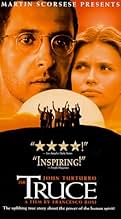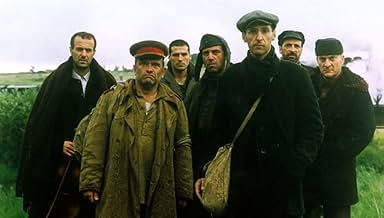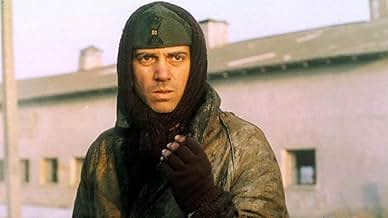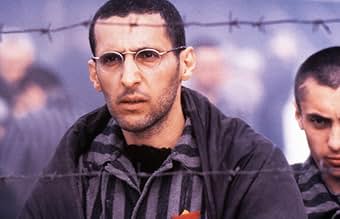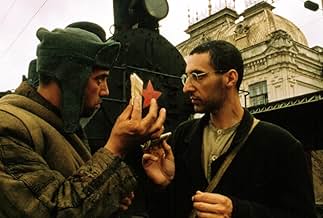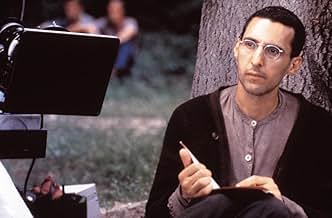VALUTAZIONE IMDb
6,6/10
1929
LA TUA VALUTAZIONE
Tratto dall'autobiografico "Il risveglio" di Primo Levi.Tratto dall'autobiografico "Il risveglio" di Primo Levi.Tratto dall'autobiografico "Il risveglio" di Primo Levi.
- Regia
- Sceneggiatura
- Star
- Premi
- 7 vittorie e 9 candidature totali
Tatyana Cherkasova
- Irina
- (as Tatyana Meshcherina)
Recensioni in evidenza
"The Truce" is unlike any other Holocaust film I've ever seen in at least two respects. First, it is focused on the return to their homes via the Soviet Union of a group of survivors from Auschwitz. Second, the events are distilled through the eyes of a particular victim, Primo Levi, an Italian chemist and disbelieving Jew, who recorded his experiences in an autobiographical memoir, "The Reawakening," transformed into a film by the Italian director, Francesco Rosi. Levi himself is portrayed by John Turturro, the only name likely to be recognized by an American audience. Turturro is a skilled actor and his performance is marked by emotional restraint. There are some telling scenes in the movie (and improbable coincidences relating to reappearance of characters who had previously departed the scene for destinations unknown). What holds the film together and makes it worth seeing is Levi's sensibility and occasional direct quotes: e.g., "In a world where there is Auschwitz, there is no God." This is not a great movie but it is very good.
I suppose everyone has seen one or more film representations of The Holocaust, but this one is different. It focuses not on the horror of the events themselves, rather, it's main thrust is struggle to return from the nightmare.
I liked the film for its apparent accuracy in location and the detail of what it was like for some of the Jews liberated from Auschwitz to find their way back to their homelands. Virtually helpless, the Jews in Primo Levi's autobiography embark on an odyssey that eventually gets them back to their homes -- at least some of them. All the more surprising is that Stalin's Soviet Union is their main benefactor throughout all of this. While this is supposed to be an autobiography, I have to wonder at some of the scenes, for example, when the train load of Jews arrives at the Munich main rail station, a former Werhmacht soldier kneels before them. In another, a Jew with barely enough food for himself, gives some bread to German POWs in Russia so that he can watch them fight over it. The irony is unmistakable.
Overall, I liked the film. It's one you have to see more than once because of all the detail. It's a bit difficult to follow the dialog in part, because much of it is in the language of the people who are represented: Poles, Russians, Ukrainians, French, Germans, Italians. Not only that, but the English dialog is accented and somewhat difficult to follow.
I intend to see it at least one or two more times in order to get the full effect of this very well done story.
I liked the film for its apparent accuracy in location and the detail of what it was like for some of the Jews liberated from Auschwitz to find their way back to their homelands. Virtually helpless, the Jews in Primo Levi's autobiography embark on an odyssey that eventually gets them back to their homes -- at least some of them. All the more surprising is that Stalin's Soviet Union is their main benefactor throughout all of this. While this is supposed to be an autobiography, I have to wonder at some of the scenes, for example, when the train load of Jews arrives at the Munich main rail station, a former Werhmacht soldier kneels before them. In another, a Jew with barely enough food for himself, gives some bread to German POWs in Russia so that he can watch them fight over it. The irony is unmistakable.
Overall, I liked the film. It's one you have to see more than once because of all the detail. It's a bit difficult to follow the dialog in part, because much of it is in the language of the people who are represented: Poles, Russians, Ukrainians, French, Germans, Italians. Not only that, but the English dialog is accented and somewhat difficult to follow.
I intend to see it at least one or two more times in order to get the full effect of this very well done story.
The Truce is a great movie. Even if this is not your type of movie that you would want to see, the story in itself is terrific. The story of post-holocaust, the close of the 2nd World War in Europe and the prime of Stalin in command is the setting of the movie. The actors bring out the greatness of the story with their colorful and realistic characters. This story, of a kind of Italian band of brothers, trying to get back home is the plot to one of the best movies dealing with redemption in 1945 Europe. Agnieszka Wagner is down right stunning. Although she plays a simple role, it is moments like these, with her on camera that make the movie good. The entire movie is packed with moments of laughter, horror, sweetness and truth. The Truce is a forgotten classic of its genre.
Just saw it, think it was great. Had no problems understanding the english at all. Kinda slow but I think that's the only way to make a movie like this, especially when it's a true story .. Nice to see a slow movie sometimes, most movies of today are to hectic. Good movie, absolutely worth while seeing.
8=G=
"The Truce" chronicles the homeward bound odyssey of an Auschwicz survivor - Primo played by Turturro - in the chaos immediately following the fall of the Third Reich. Although Primo, an Italian Jew, is the central character, the camera spends more time on the people, places, and vicissitudes which he encounters on his journey from Krakow to Turin. This beautifully shot, somber film with an abundance of extras and a minimal core cast has no specific focus. The interest in this film is in the story and the story is in the telling. A very worthy cinematic endeavor.
Lo sapevi?
- QuizFinal film written and directed by Francesco Rosi.
- Citazioni
[last lines]
Primo Levi: [narrating] You who live secure in your warm houses, who return at evening to find hot food and friendly faces. Consider if this is a man who labors in the mud, who knows no peace, who fights for a crust of bread, who dies at a yes or a no. Meditate that this took place.
- ConnessioniFeatured in The Movie Show: Episodio datato 19 ottobre 1997 (1997)
- Colonne sonoreMadonina
Written by Giovanni D'Anzi (as G. D'Anzi)
I più visti
Accedi per valutare e creare un elenco di titoli salvati per ottenere consigli personalizzati
- How long is The Truce?Powered by Alexa
Dettagli
Botteghino
- Lordo Stati Uniti e Canada
- 71.448 USD
- Fine settimana di apertura Stati Uniti e Canada
- 23.165 USD
- 26 apr 1998
- Tempo di esecuzione2 ore 5 minuti
- Colore
- Mix di suoni
- Proporzioni
- 1.85 : 1
Contribuisci a questa pagina
Suggerisci una modifica o aggiungi i contenuti mancanti

